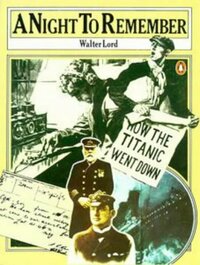Take a photo of a barcode or cover
adventurous
dark
emotional
informative
inspiring
reflective
sad
tense
medium-paced
dark
informative
sad
fast-paced
This is everything you think it is. An incredibly well-researched and written, concise and detailed narrative of the entirety of the understanding of the disaster as of 1955. You wouldn’t even know this was written so long ago because it holds up so well with new research. Required reading for anyone interested in this tragedy.
informative
sad
slow-paced
emotional
informative
sad
medium-paced
Really enjoyed this. I love reading about the Titanic and this, along with Archibald Gracie’s survivor account, offered a really vivid picture. It was super interesting hearing Mr Gracie’s name mentioned often in this book as well. I also picked up on a lot of lines and information they incorporated into Titanic, the movie. Definitely emotional at times. Such a tragedy. But a great book on the topic.
Put together from interviews with survivors, Lord pieces together what happened the night that the Titanic sunk, and the rescue of the survivors, and gives it to us as a minute by minute story. There was very little factual information that I didn't already know, but it was still fascinating reading - although (of course) a lot of names.
adventurous
emotional
informative
reflective
sad
fast-paced
My grade 9 teacher handed this to us, saying, "this book is a major Hollywood movie with Leonardo Dicaprio!" What a snake-oil saleswoman.
This book is so many kinds of boring. It is amazing that one of the worst disasters in nautical history can be clinically outlined like a police report. I've read history textbooks with more narrative flair. I couldn't finish it. I cannot recommend this book, except as a non-medicinal alternative to sleep medication.
This book is so many kinds of boring. It is amazing that one of the worst disasters in nautical history can be clinically outlined like a police report. I've read history textbooks with more narrative flair. I couldn't finish it. I cannot recommend this book, except as a non-medicinal alternative to sleep medication.
This is the second non-fiction that I have read which chronicles the sinking of the Titanic. Lord’s book starts mere hours before the sinking. This book jumps from person to person and gives the reader a well-rounded perspective of the events as they occurred across the ship. I think I would have preferred a select few characters as it didn’t allow me to really concentrate on who was doing what. The events on the ship are really par for the course and what you would expect in a non-fiction account.
The interesting aspects of this book are that we get to see what happened on the Carpathia as it came to rescue the survivors and on the California as it stood by confused as to what those lights in the distance were all about. Those on-board the Carpathia were quite heroic as they rushed to the site of the disaster and prepped their ship to receive the survivors and keep them in comfort back to New York. On the opposite end, I was extremely angry with the actions of those on board the California. They see mysterious lights and flares in the distance and never thought that a ship might be signaling for some reason and that they should turn on their radios to see what was happening. The addition of these two aspects was unique for me and really set this apart from the other book I had read on the subject.
It was also interesting that the author frequently mentioned what was happening with Titanic passenger Colonel Archibald Gracie. He is the author of the previous book I had read on Titanic and several of the stories that he told were also chronicled here.
This narrator kept the story interesting and made the events feel new all over again, which can be difficult with an event that everyone knows so well.
The interesting aspects of this book are that we get to see what happened on the Carpathia as it came to rescue the survivors and on the California as it stood by confused as to what those lights in the distance were all about. Those on-board the Carpathia were quite heroic as they rushed to the site of the disaster and prepped their ship to receive the survivors and keep them in comfort back to New York. On the opposite end, I was extremely angry with the actions of those on board the California. They see mysterious lights and flares in the distance and never thought that a ship might be signaling for some reason and that they should turn on their radios to see what was happening. The addition of these two aspects was unique for me and really set this apart from the other book I had read on the subject.
It was also interesting that the author frequently mentioned what was happening with Titanic passenger Colonel Archibald Gracie. He is the author of the previous book I had read on Titanic and several of the stories that he told were also chronicled here.
This narrator kept the story interesting and made the events feel new all over again, which can be difficult with an event that everyone knows so well.
This is the quintessential book about the Titanic disaster in 1912, and with the hundredth anniversary of the ship's maiden voyage and tumultuous end I decided to pick this up for my Kindle. I have probably read it before, as the Titanic was a subject that interested me greatly in school and was the subject of several papers, but I didn't find the book familiar at all and quite enjoyed it.
The book largely focuses on the events of the night of the sinking on April 14, 1912, and narrows the focus even further to the three hours between the iceberg strike and the ship going down. The author's writing is clear, concise, and easy to follow even as he follows different people and uses different sources for his story. At no time does the book fall into maudlin or overly emotional affectations, as I'm sure would be the case if this were repeated in a modern situation, and the echoes of the Victorian behavior commented upon at the close of the book appear to affect the writing (and for the better). The book even covers a bit of the media frenzy as well as the investigations after the survivors were taken to New York, and both of those chapters have relevance to us even today. It's worth a read for anyone interested in the subject matter, and I would expand that to anyone who is interested in how to write a truthful story from eyewitness testimony, or even in how to write a story with tens to hundreds of characters. The writing is indeed that good, and quite a few modern authors could learn a bit from Walter Lord.
The book largely focuses on the events of the night of the sinking on April 14, 1912, and narrows the focus even further to the three hours between the iceberg strike and the ship going down. The author's writing is clear, concise, and easy to follow even as he follows different people and uses different sources for his story. At no time does the book fall into maudlin or overly emotional affectations, as I'm sure would be the case if this were repeated in a modern situation, and the echoes of the Victorian behavior commented upon at the close of the book appear to affect the writing (and for the better). The book even covers a bit of the media frenzy as well as the investigations after the survivors were taken to New York, and both of those chapters have relevance to us even today. It's worth a read for anyone interested in the subject matter, and I would expand that to anyone who is interested in how to write a truthful story from eyewitness testimony, or even in how to write a story with tens to hundreds of characters. The writing is indeed that good, and quite a few modern authors could learn a bit from Walter Lord.






